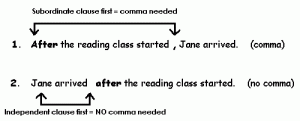
✅ AI Essay Writer ✅ AI Detector ✅ Plagchecker ✅ Paraphraser
✅ Summarizer ✅ Citation Generator
What’s the Difference Between Independent and Subordinate Clauses?
English sentences can exist in the form of both independent and subordinate clauses. An independent clause is a complete sentence that contains a subject, a verb, and conveys a complete thought (or thoughts), which has a meaning that is clear.
e.g. Jane and I (subjects) have always been (verb) good friends (predicate).
In its turn, a subordinate clause possesses a subject and a verb as well, but it does not convey a complete thought. Even when they make sense on their own, they still depend on the context in which they have been used. Subordinate clauses usually begin with conjunctions such as while, where, unless, though, because, whereas, since, and so on.
e.g. My sister winced because the door squeaked.
Word Order in Subordinate Sentences
The general rule is that the word order is the same as in regular affirmative sentences; as for conjunctions, they are often placed between clauses. However, there are nuances:
1. Clauses starting with “wh’ question words (such as when or where) from which certain clauses are usually started can be confusing, as they often make a declaration look like a question. However, the word order in such clauses remains the same as in affirmative sentences.
e.g. I have no idea who this guy is (despite the word “who” the sentences remains declarative, and the word order does not change).
2. The same word order in subordinate clauses is kept even in questions.
e.g. Do you know who they are?
Instead of:
“Do you know who are they?”
This is because “who they are” is a subordinate clause, whereas “do you know” is the actual question.
Follow us on Reddit for more insights and updates.



Comments (0)
Welcome to A*Help comments!
We’re all about debate and discussion at A*Help.
We value the diverse opinions of users, so you may find points of view that you don’t agree with. And that’s cool. However, there are certain things we’re not OK with: attempts to manipulate our data in any way, for example, or the posting of discriminative, offensive, hateful, or disparaging material.
Comments are closed.